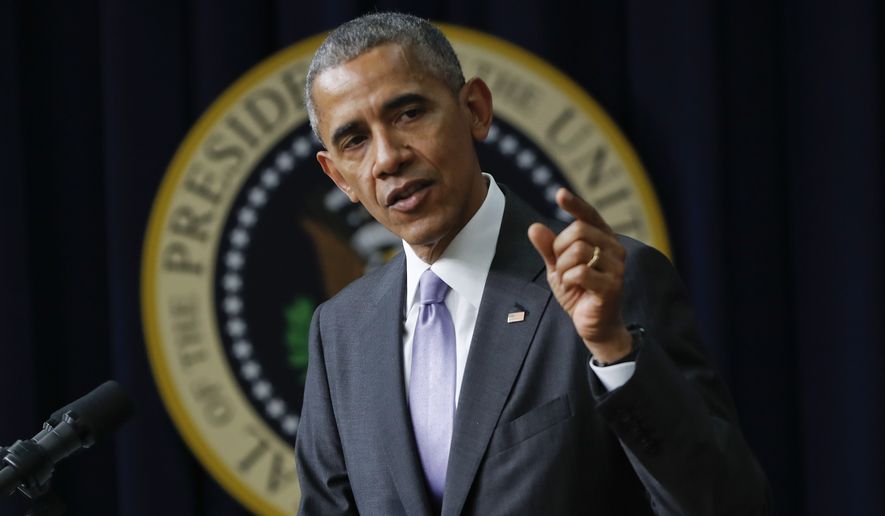The Obama administration rushed Thursday to cancel a program set up in the wake of Sept. 11 to track and deport illegal immigrant Muslim and Arab men, hoping to hinder President-elect Donald Trump’s plans to impose “extreme vetting” on Muslim visitors.
Civil rights and immigrant groups cheered the move and said they hoped it would force a rethink by Mr. Trump who, while softening some of his other positions postelection, has not budged on his call for more thorough checks on those coming into the U.S. from terrorism-connected countries.
The National Security Entry-Exit Registration System had been dormant for years, but activists demanded that the Obama administration take it off the books entirely. They feared Mr. Trump could use the program as a shortcut to starting his own vetting.
“Keeping NSEERS out of Trump’s hands was the right thing to do,” said David Leopold, a prominent immigration advocate and former head of the American Immigration Lawyers Association.
The Bush administration set up the program in 2002 as a way to track Muslim men in the U.S. When it was fully operational, the program required new arrivals to turn over extra biographical information and required those planning to stay more than 30 days to provide even more data, including where they planned to stay in the U.S. Those already in the country were also asked to register.
The goal was to give authorities a way to keep tabs on potential bad actors such as the 19 Sept. 11 hijackers who came into the U.S. legally but stayed after their visas expired, which made them illegal immigrants at the time of the attacks.
The system initially targeted visitors from Iran, Iraq, Syria, Libya and Sudan, but the Bush administration was also concerned about male visitors ages 16 to 45 from Pakistan, Saudi Arabia and Yemen.
The system was controversial from the start, and the 30-day and reregistration requirements were quickly dropped. Much of the rest of the program was made obsolete as border checks were brought into the digital age.
When the program was operational, it required border officers to manually collect information from visitors. The Homeland Security Department says it now has automated systems that collect better information, making the program outdated as well as inefficient.
“DHS has determined that the NSEERS model for border vetting and security, which focused on designated nationalities for special processing, is outmoded,” Homeland Security Secretary Jeh Johnson said Thursday in his official submission to cancel the program.
He said the program, which was fully suspended in 2011, would be taken off the books immediately.
Jessica Vaughan, an enforcement advocate and policy studies director at the Center for Immigration Studies, said she wasn’t sure why the administration was pushing to remove the regulations if the program already had been frozen.
She said the program was effective in locating foreigners who had overstayed their visas, helping immigration agents track down and deport some and spurring others in the U.S. illegally to go back to their home countries.
“Back then, we had no entry-exit tracking and no way of knowing which of the people admitted from risky areas had departed. Now we have a biographic matching system, so it’s probably not necessary to re-create NSEERS in the same form,” she said.
Instead, she said, the administration can use the information being collected electronically to determine whom immigration agents should pursue.
Civil rights groups said NSEERS, during its decade in operation, didn’t lead to a single terrorism conviction and that revoking the framework of the system would help protect Muslim and Arab immigrants.
Rescinding the NSEERS doesn’t stop Mr. Trump, but it does mean he would have to set up a new program rather than renew an existing one — a higher hurdle and a longer process.
The president-elect said Wednesday, in the wake of a terrorist attack in Germany, that he is still determined to pursue his extreme vetting. “You know my plans. All along, I’ve been proven to be right,” he said.
Immigrant rights groups have been fearful of what Mr. Trump will do once in office.
“Painting entire communities with a broad brush of suspicion is wholly inconsistent with our nation’s values,” said Royce Murray, policy director at the American Immigration Council. “The next administration should not repeat the mistakes of the past and institute any discriminatory registry.”
• Stephen Dinan can be reached at sdinan@washingtontimes.com.




Please read our comment policy before commenting.